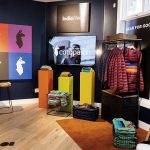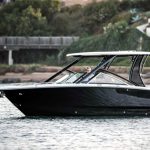Billabong International revealed that it had failed to reach a takeover deal with either of its two U.S. private equity suitors. But the Australian surf giant indicated that it is close to a refinancing deal that could save the company and it was now exploring sales of individual assets as part of the effort.
After 16 months of takeover offers from four different buyers, Billabong last week declared that “change of control discussions” with Altamont Capital Partners and Sycamore Partners had concluded without an agreement. The company said it is now negotiating a new deal in which one of the buyout funds will purchase one or more of Billabong’s brands, with the funds to be used to reduce the company’s debt.
Former Billabong Americas boss Paul Naude is continuing to work in concert with Sycamore. However, VF Corp., which had shown interest in acquiring just the Billabong surf brand, has not rejoined former consortium partner Altamont in the latest talks.
Besides the flagship Billabong brand, the company’s brands include Element, Von Zipper, Honolua Surf Company, Kustom, Palmers Surf, Xcel, Tigerlily, Sector 9, DaKine and RVCA brands. It also owns Canada’s West 49 chain.
Analysts at Citigroup Inc. estimated that RVCA, the surf apparel brand that Billabong bought in 2010, could be sold for around Australian $50 million (US$48 mm) while three brands – RVCA, Billabong and bags and accessories-specialist DaKine – combined could fetch Australian $110 million.
The company also confirmed it was looking to sell the 70-store Canadian action sports chain West 49, which it purchased just three years ago for Australian $91 million. It reportedly hired New York investment firm Financo to assist in the sale.
The proceeds from any sale would be used to repay in full the companys existing syndicated debt facilities. No period of exclusivity has been granted to either party with regards to the potential refinancing. It reportedly owes Australian $300 million to its lenders and has run close to breaching its banking covenants earlier this year,
The refinancing is intended to provide the company with a comprehensive solution and an appropriate capital structure, allowing it to continue its reform agenda, said Billabong Chairman Ian Pollard. Its our intention to conclude these discussions as soon as practically possible while aggressively reducing costs across all our global operations.
Blaming poor sales in its Australian retail division and higher than expected losses from its 51 percent-owned Internet retail joint venture SurfStitch, Billabong also last week cut earnings forecasts by up to 10 percent, representing its fourth profit downgrade in the space of 18 months.
It now expects EBITDA before special items be come in between Australian $67 million to $74 million for the current year. A February guidance update called for EBITDA in a range of Australian $74 million to $85 million, which included up to Australian $4 million from its equity interest in the Nixon watch brand in the top end of the range. Excluding the Nixon equity contribution, EBITDA was expected to range between Australian $74 million to $81 million.
By region, the top performer so far this year is the Americas, which is running slightly ahead of plan for the half. Billabong said of the Americas, Retail in particular has improved. It should be noted that June is an important month, especially for our wholesale business in the northern hemisphere, and earnings can be volatile depending on shipping cycles.
In Australia, revenues are below expectations in the half, principally in Australian bricks and mortar retail (excluding e-commerce). While Australian wholesale is on plan, its performance in Australian retail is below last year. On a comparable store basis, year to date sales are down 5.4 percent and gross profit is 2.3 percent below the previous corresponding period.
Europe likewise remains weak, especially for the Billabong brand as largely anticipated in the guidance provided in its February announcement. Added Billabong in the statement, Our e-commerce start-up losses in SurfStitch Europe (which we consolidate but only have a 51 percent interest in) have been Australian $4 million larger than anticipated and we are taking appropriate steps to limit these losses.
Billabong, which has been actively dealing with takeover approaches since February last year, has plans to restructure its business by eliminating underperforming brands and stores while consolidating its product range and centralizing management of its three global divisions.
On the Australian stock exchange, the company is now valued at just Australian $110 million compared with more than Australian $3.5 billion in 2007.















